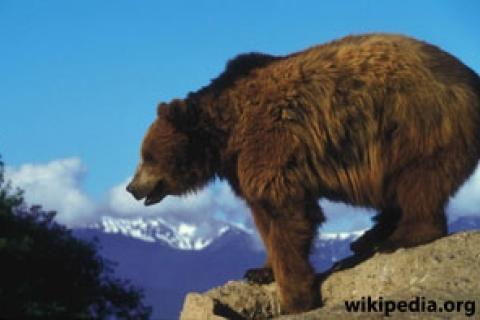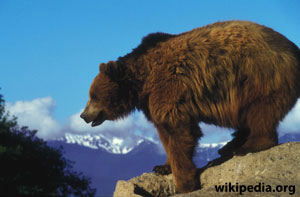
You're hiking toward a distant fishing hole when the trail makes a sharp turn and you come face to face with a bear hunkered over a freshly killed deer. It raises up on hind legs, mouth covered in blood. Then suddenly it drops to all fours, flares its ears back and glares at you menacingly.
 |
| Grizzly bears are known to be more aggressive and dangerous than black bears. |
That's a scene that many of us have probably pictured in our minds. And a few of us have actually encountered. Usually they end up benignly with the angler or hunter backing away and the bear either scurrying away or continuing to consume its kill.
But there are definite dangers for outdoorsmen and women from both black bears and grizzlies. While grizzlies are known to be more aggressive and dangerous, dozens of people have been killed by black bears and many more seriously injured.
As bear numbers continue to rise across the country, anglers, campers and hunters need to be aware of safe practices when entering bear country. And these days, bear country covers lots of territory!
Why Bears Attack Humans
Bears involved in attacks on humans typically fit in two categories: They live in the wilderness and have no contact with humans and thus little or no fear of them; or they have been fed by humans or found food around humans and thus associate man with food. This particularly occurs in or around parks, where the lack of hunting also emboldens the animals.
How to Avoid Them
#1 — Stay away from bear feeding areas such as berry patches, fresh burns, lake shores, alpine meadows, streams full of spawning fish or avalanche slopes when possible. If you see bear scat, tracks or claw marks on trees, move elsewhere. Also leave if you encounter a fresh kill or places where leaves and branches have been piled up, possibly over a carcass. A bear could be lurking nearby.
#2 — Avoid walking after dark in bear country and do not travel alone. Studies show that groups of four or more people are seldom attacked. Make noise by talking, singing or playing music, anything to alert bears to your presence. Most will move away if they hear you and are not taken by surprise.
#3 — Always sleep inside a tent, but keep your cooking and food storage area 50-75 yards away when possible. Wear a hat while cooking so food odors don't concentrate in your hair. Leave the hat at the cooking area. Avoid greasy or smelly foods such as bacon, sausage or fish. Store leftovers in airtight containers far away and wash dishes carefully to avoid leaving scent or grease on them.
#4 — Burn trash thoroughly and bury or pack it out, but avoid burning just before dark. The smell of burning garbage may actually attract bears. Never bury trash without burning it first.
#5 — Field dress animals and clean fish far from your campsite, and be cautious approaching a game animal you left overnight. Hang quarters of game high in trees, away from the sleeping area.
By following these steps, outdoorsmen can greatly reduce the likelihood of bear encounters in camp.
What to Do if You Encounter a Bear
If you're walking toward a hunting or fishing spot and encounter a bear, back off and take a different route. Give it a wide berth. Most bear attacks can be avoided with a bit of caution and respect for these marvelous wild animals who really don't want an encounter any more than we do.
As a safety precaution, carry a can of pepper spray or bear detterent for that rare instance when a bear actually does want to attack you, or where legal, a firearm. Use both only as a last resort when a bear is in full charge, not a "bluff" charge where it runs a few feet, then stops.
- 4510 views

